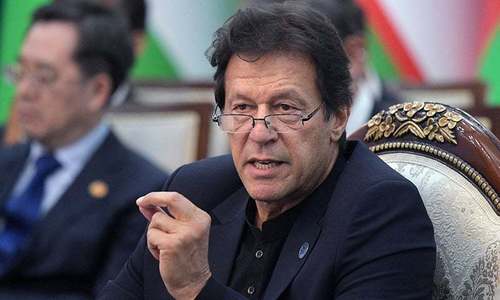ISLAMABAD: Sindh Chief Minister Syed Murad Ali Shah has written a letter to Prime Minister Imran Khan, expressing concern over several major issues, including stoppage of funds by the federal government for health and population projects, gas shortage in the province and delay in the formation of a committee on water distribution among the provinces.
In the letter written on Dec 25, two days after a meeting of the Council of Common Interests (CII), Mr Shah asks the prime minister to direct the relevant departments to release “due amounts to the provinces” as funding for “the devolved vertical programmes on health and population”.
Through the letter, a copy of which is available with Dawn, the CM informs the prime minister that the Sindh government has decided to write letters directly to the ministries concerned to seek release of the funds, which had been stopped by the federal government since July 1, 2018.
Murad expresses concern over halt to funds for critical health projects, gas shortage & water distribution
Providing background information, a senior official of the Ministry of National Health Services (NHS) told Dawn that the federal government initially decided to stop providing funds to the provinces for the vertical programmes on health in 2011 when as a result of the passage of the 18th Amendment, the subject of health and population was devolved to the provinces.
However, he said, the provinces protested over the move, taking the stance that the decision was being made after finalisation of the National Finance Commission (NFC) Award in 2010.
The provinces said that had they been informed about this decision in advance, they would have sought an increase in their shares in the NFC Award.
Considering the provinces’ concerns as genuine, the CCI later decided that the funding of the vertical programmes would continue till finalisation of the next NFC Award.
In his letter to the PM, the Sindh chief minister also mentions that “the decisions of the CCI on April 28, 2011 and January 23, 2013 that the federal government will finance these vertical programmes until the next NFC are still in force”.
The NHS official said that the issue was discussed in the CCI meeting on Dec 23, 2019, and the prime minister had already directed the federal health ministry to arrange a meeting with the provincial health ministers and secretaries to sort out the matter. The meeting is expected to be held within two weeks.
The term “vertical health programmes” is used for special and temporary projects launched from time to time to deal with specific diseases and health conditions, other than providing treatment for general diseases.
After the passage of the 18th Amendment, though the subject of health had been devolved to the provinces, around 12 vertical health programmes were kept at the federal level. These programmes included polio eradication, AIDS control, childhood tuberculosis and Hepatitis-B.
The issue had also come under discussion in a meeting of the Senate Standing Committee on NHS in May in which the legislators had expressed concern over the stoppage of funds to the provinces.
The NHS secretary had apprised the committee members that the funds were provided to the provinces in 2011 through the NFC Award and further allocation was to be made through the next NFC Award which was due in 2015. However, he said, the ministry kept on supporting the programme till June 2018, despite the fact that the NFC Award was not finalised.
In his letter, the Sindh chief minister also raised the long-standing issue of non-implementation of the Water Apportionment Accord 1991 and asked the prime minister to set up a committee, comprising the attorney general, four advocate generals and technical experts from the provinces, to “jointly review and give its recommendations to the CCI in the matter within a month”.
Similarly, the CM demands that the no objection certificate (NOC) issued by the Indus River System Authority for setting up a power plant on Chashma-Jhelum Link Canal “shall have no effect” till the review of the feasibility of the project by the Ministry of Energy.
Published in Dawn, January 1st, 2020














































